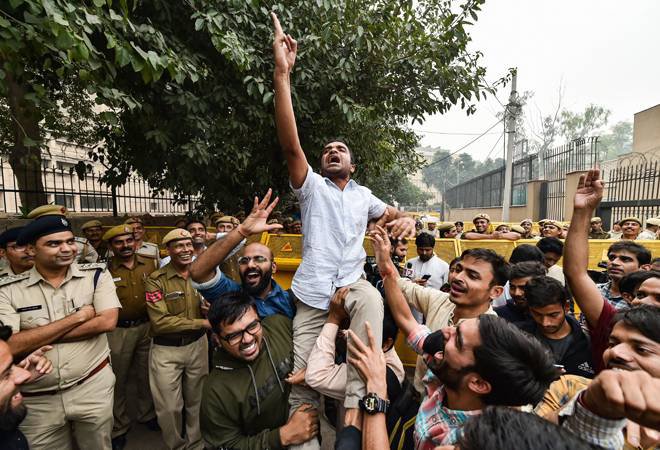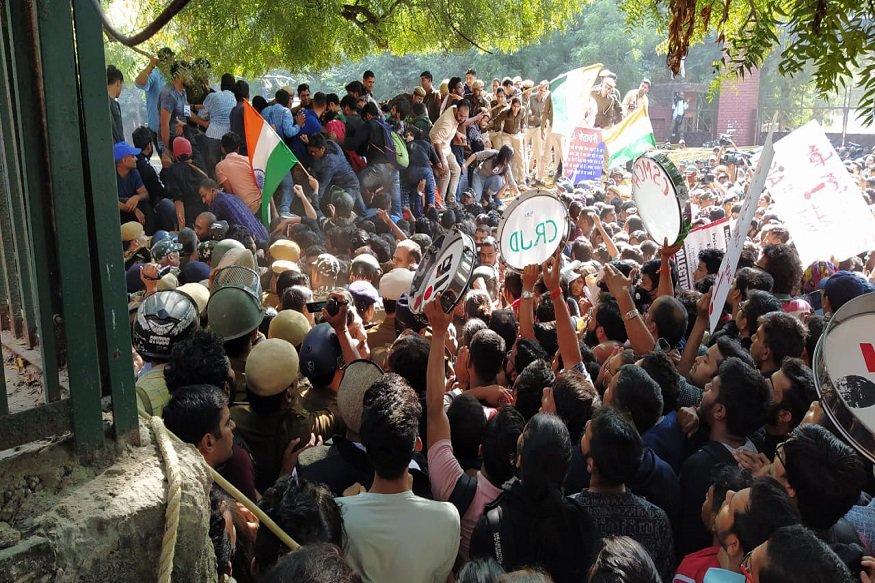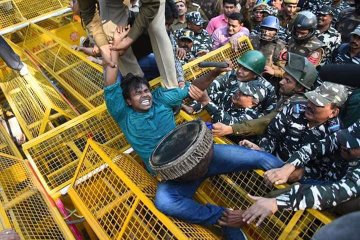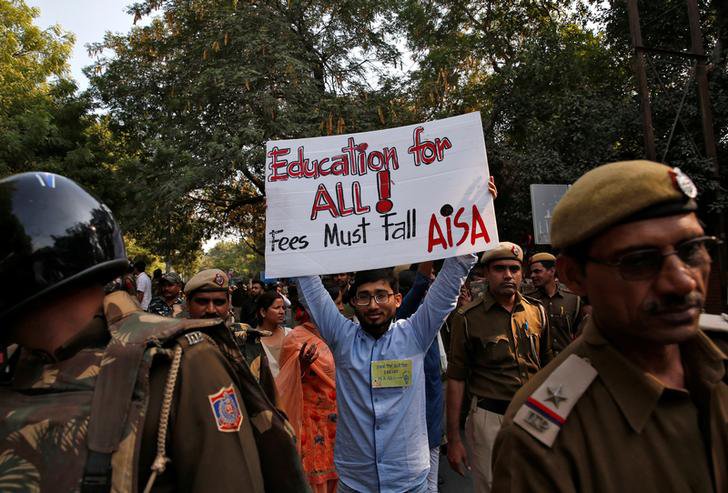It’s been more than 10 days, the students of Jawaharlal Nehru University, Delhi have been protesting against the fee hike after a draft hostel manual was issued which includes provisions including hostel fee hike, dress code and hostel timings.
Recently, disturbing visuals of the students being beaten up by the police personnel emerged on social media as the protests took a violent turn.

The protests which have also garnered support from the students of the other universities in Delhi, started in the first week of October, when the new hostel manual for the JNU students was made public.
Monday, 11th November: Protests intensified when angry students blocked the road behind the university, confining HRD Minister Ramesh Pokhriyal to the premises for almost six hours.

Wednesday, 13th November: After intensified protests the university administration announced a partial roll-back in the fee hike and assistance for students of economically weaker sections.
#JNU Executive Committee announces major roll-back in the hostel fee and other stipulations. Also proposes a scheme for economic assistance to the EWS students. Time to get back to classes. @HRDMinistry
— R. Subrahmanyam (@subrahyd) November 13, 2019
According to a report by News18, the new proposal put forward by the executive committee, has made the following changes. The rent for a double-seater room, which was hiked to Rs 200 per month from Rs 10 per month earlier, has now been reduced to Rs 100 per month. Rent for the single-seater room, proposed at Rs 600 per month from Rs 20 per month earlier, has been reduced to Rs 200 per month. The one-time refundable mess security fee has been hiked from Rs 5,500 to Rs 12,000.
However, the main bone of contention – the utility charges of Rs 1,700 – remained.

The protests continued even after the announcement as the students said that their main demands haven’t been addressed.
Sunday, 17th November: JNU Vice-chancellor M Jagadesh Kumar urged the protesting students to return to their classes as exams are near.
Delhi: Security deployed outside Jawaharlal Nehru University (JNU); Jawaharlal Nehru University Students’ Union to march to Parliament today demanding complete roll back of fee hike pic.twitter.com/n9ESBZ5HtZ
— ANI (@ANI) November 18, 2019
Monday, 18th November: The students, led by the JNU Students’ Union (JNUSU), planned a protest march to the Parliament, but the Delhi Police said that the JNU students were not granted the permission to carry out the protest march.
Later, Section 144 was imposed outside the JNU campus and despite the ban, hundreds of students started their protest march.
Delhi: Jawaharlal Nehru University Students march towards Parliament over their demand of complete fee roll back along with other demands pic.twitter.com/iqdyDCzZQh
— ANI (@ANI) November 18, 2019
The Delhi Police stopped the students at the Ber Sarai road. Hundreds of protesting students were detained by the police along with the JNUSU chief.
Delhi: Police remove Jawaharlal Nehru University (JNU) students who are protesting near Safdarjung Tomb, demanding complete fee roll back along with other demands. pic.twitter.com/NOxxlVoZg4
— ANI (@ANI) November 18, 2019
#WATCH: Jawaharlal Nehru University (JNU) students protest near Safdarjung Tomb after their march to Parliament was stopped by Police. They are demanding complete fee roll back along with other demands. pic.twitter.com/qstFa3G5SN
— ANI (@ANI) November 18, 2019
#DelhiPolice remove #JawaharlalNehruUniversity students who are protesting near Safdarjung Tomb, demanding complete fee roll back along with other demands. | ANI#JNUFeeHike #LeftKillingJNU #JNUProtests #JNU pic.twitter.com/8wAolEDtAW
— Afternoon Voice (@Afternoon_Voice) November 18, 2019
According to a report by India Today, the entry and exit gates at three Delhi Metro stations, Udyog Bhawan, Patel Chowk, and Central Secretariat, were closed temporarily.
At around 9.00 PM, all the students detained by the Delhi Police were released and all closed metro station gates were opened.

Tuesday, 19th November: The JNU Students’ Union decided to hold a press conference at 4 PM amid a standoff with the Delhi police.
CPI Parliamentary Group leader Binoy Vishwam gave a notice to suspend the business of the Upper House to discuss police assault on JNU students. Following this, Rajya Sabha was adjourned and the matter was also take up by the Lok Sabha.
The HRD Ministry also formed a three-member panel to recommend measures for restoration of normal functioning of the central university.
As of now, the Delhi police has registered an FIR in connection with the protests led by the JNU students.
Delhi: Police registers FIR in connection with yesterday’s protest by Jawaharlal Nehru University (JNU) students. More details waited. pic.twitter.com/XPpDluoea9
— ANI (@ANI) November 19, 2019

















